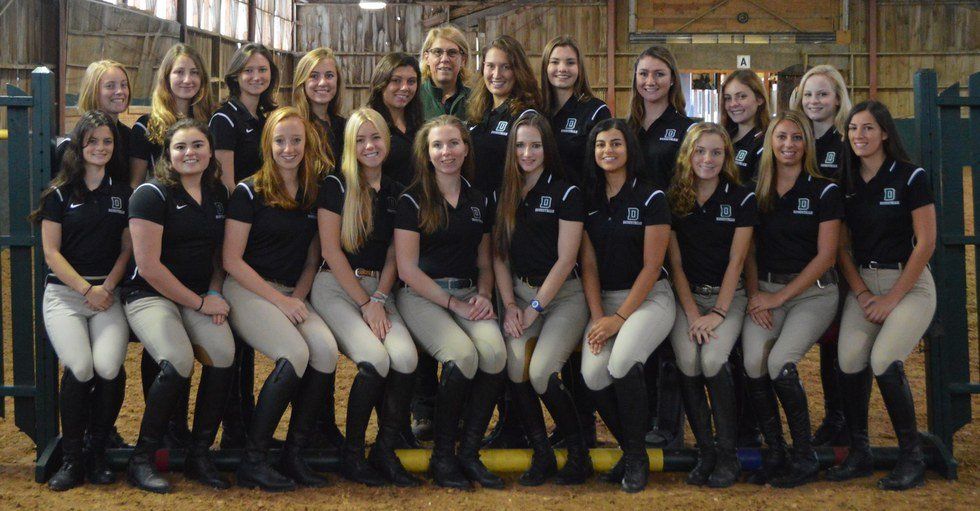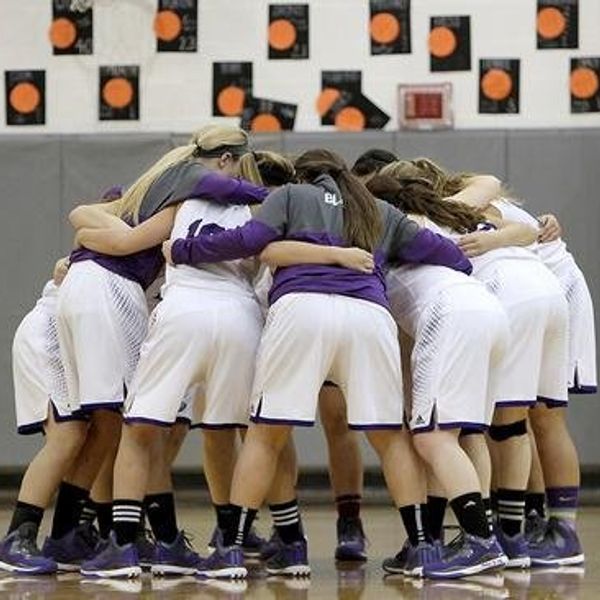Dartmouth equestrian kicked off our season this weekend with double-header horse shows at Middlebury and the University of Vermont. I personally love being a part of the equestrian team because horses are a great break from my hectic life as a Dartmouth student. I joined the team because I really wanted horses to be a large part of my college experience. Up until college, I spent a lot of time riding, but never really got a chance to horse show because I never had my own horse. Intercollegiate horse showing is much different than the average horse show. Here are a few things most people don’t know about the Intercollegiate Horse Show Association.
1. Students draw random horses that they usually have never ridden.
This is probably the largest difference between intercollegiate horse showing and regular hunter/ jumper horse shows. Unlike most shows, where riders bring their own horses to compete on, in the IHSA riders draw random horses to ride. Usually the horses are owned by the host school and the riders most likely have never ridden the horse they draw. Getting on a horse you have never ridden is a game changer compared to normal horse shows where the riders get to ride their own horses that they work with on a daily basis. I really like the challenge of having to figure a new horse out and get it to jump around a course of fences smoothly without really knowing it. Unfortunately, sometimes it can be a little bit luck of the draw as to which horse you get, which can occasionally be slightly frustrating. One great thing about this system though is a lower cost for the girls showing. Bringing horses to each competition gets very expensive and by riding the host school’s horses, expenses are significantly decreased.
2. Riders are judged on their equitation.
In English, that means riders are judged on how nicely they look on a horse. Some specific things a judge tends to look for when judging a rider is his/ her leg position, shoulders, subtleness, and overall ability to get the horse to jump all the appropriate fences. The judge is supposed to consider which horse a rider is on and distinguish rider ability without considering the quality of the horse. Unfortunately, it can be a very subjective sport and some judges look for a certain style or rider characteristic more than others.
3. It is a team sport.
Though riding horses is an individual sport, in the IHSA it is also very much a team activity. Individuals compete for their school and in each division one rider from every school is considered the “point rider”. Only the point riders’ results for the day get considered when calculating a school’s team results from a show. This point system allows smaller schools to compete on an even playing field against larger schools. It also makes for a very close team dynamic because everyone has a common goal to represent their school in the best way possible. Some of my closest friends at Dartmouth are people I know through the equestrian team. I couldn’t ask for a better group to spend all of my weekends with.
4. There are classes offered for all riding abilities.
One great thing about Intercollegiate equestrian competitions is that there are divisions, also referred to as classes, offered for riders of all levels. From walk/ trot all the way up to open fences there is a class for all levels and abilities.
5. There are jumping and flat classes.
IHSA horse shows are divided into two sections, jumping and flat classes. The jumping classes are in the morning and usually consist of three divisions. The first division is open which is the most advanced division. The most experienced riders usually show in open and the fences are usually set at the highest height of the show for this division. There are also intermediate and novice fences. These classes have lower fence heights but are relatively similar to the open jumping division. Riders go in the ring individually and are expected to navigate their way around a course of predetermined jumps. In the afternoon, there are open/ intermediate/ and novice flat classes. These classes are usually many of the same riders from the jumping divisions and riders are expected to ride the horses they have drawn at a walk, trot, and canter. Flat classes are done in larger groups with usually about 5-10 riders and horses in the ring at a time. Riders must have the proper position and be able to leave a lasting impression on the judge despite the larger crowds. After the first set of flat classes, there are more flat classes that tailor towards lower level riders that are not ready to jump yet.
6. Riders can compete all the way up to a national level.
Inter collegiate horse shows are not just local. If riders compete all year successfully they can have the opportunity to advance to regionals, zones, and even nationals in their respected division. Dartmouth also competes in the Ivy League championships every spring.
7. Varsity Coed sport.
Many people don’t know that Dartmouth equestrian is a varsity coed sport. Though the sport is definitely dominated by female athletes, equestrian is one of the only Olympic sports that is coed. Most people don’t know that the equestrian team gets the same support as any other D1 team such as access to the varsity gym and collaboration with tutors.
If you want to find out more about IHSA showing and the Dartmouth equestrian team make sure to come watch our home shows at Morton Farm on October 23rd and November 5th.





















